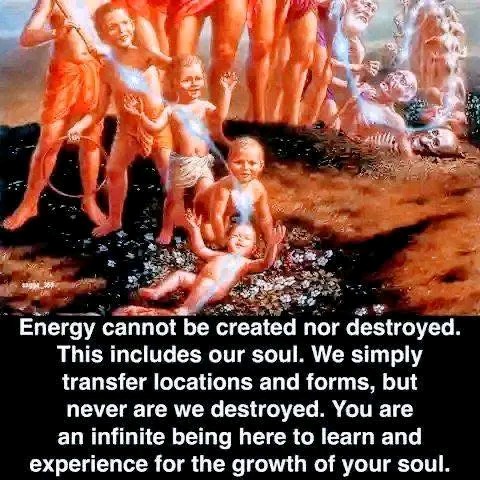07:44:57 pm 08/17/2025
Viewed: 6054
Do Our Souls Continue After Death, or Is It Just Energy?
Introduction
Few questions are as universal, unsettling, and enduring as this one:
What happens when we die?
Do we continue as disembodied souls, carrying on forever in another form? Or are we simply a complex arrangement of energy and matter that ceases once our bodies fail? Is the “soul” a real, eternal essence, or is it a story we tell ourselves because our survival instinct cannot tolerate annihilation?
The statement in the image that sparked this discussion reads:
“Energy cannot be created nor destroyed. This includes our soul. We simply transfer locations and forms, but never are we destroyed. You are an infinite being here to learn and experience for the growth of your soul.”
At first glance, this sounds comforting—and it ties into scientific language about energy conservation. But does science really support the notion of an immortal soul? Or is this more of a spiritual interpretation than a literal fact?
The Physics of Energy and the Human Body
Physics gives us a solid starting point. The first law of thermodynamics states that energy cannot be created or destroyed, only transformed. When a living being dies:
Chemical energy in food stops fueling the body.
Electrical signals in neurons fade away.
The body’s energy disperses into the environment as heat, decay, and eventually nutrients for other organisms.
In this sense, we are indeed eternal participants in the physical cycle of the universe. The energy that powered our bodies does not vanish; it simply changes form.
Yet here’s the critical limitation: physics deals with measurable, physical energy. It says nothing about subjective consciousness—the experience of self, awareness, memory, or identity. Whether that aspect persists is a very different question.
Consciousness and Its Mystery
Consciousness is not like heat or electricity—it cannot be weighed, measured, or reduced to simple physics. Neuroscience generally holds that consciousness arises as an emergent property of complex brain activity. Thinkers like Antonio Damasio argue that the self comes into being through the brain’s mapping of its own processes.1
If the brain ceases to function, this view suggests, so does awareness. In other words, when the hardware shuts down, the software cannot keep running.
But this explanation raises deeper puzzles. Philosopher David Chalmers famously described the “hard problem of consciousness”—how subjective awareness arises from physical processes.2 Why does matter become aware of itself at all?
Because we cannot fully explain this, the possibility remains open that consciousness may not be entirely dependent on the physical brain. Some theorists, like physicist Roger Penrose and anesthesiologist Stuart Hameroff, have even speculated that consciousness might be tied to quantum processes at the cellular level, perhaps connecting it to the very fabric of the universe.3
Though controversial, such theories highlight that we do not yet have a complete scientific explanation of consciousness—leaving room for philosophical and spiritual perspectives.
Religious and Philosophical Views of the Soul
Across cultures and centuries, nearly every tradition has affirmed in some way that the soul continues beyond death:
Christianity and Islam teach of eternal life in heaven or hell, or union with God.
Hinduism and Buddhism emphasize cycles of rebirth and reincarnation, where the soul or consciousness transfers into a new body.
Plato and other philosophers argued for the immortality of the soul, distinct from the physical body.4
Dualism, famously associated with René Descartes, holds that mind and body are separate substances—so the soul could survive the death of the body.5
Materialism, by contrast, argues that consciousness depends entirely on physical processes, and when the body ends, so does the self (Thomas Metzinger).6
Religious traditions provide frameworks of meaning and hope, while materialism gives the most grounded scientific answer. The fact that both perspectives remain powerful suggests that the ultimate answer is still unsettled.
The Psychology of Belief: Survival Instinct and the Soul
Why do humans believe so strongly in the eternal survival of the soul? One answer may lie in our own biology.
Every living being possesses a powerful instinct for survival. Evolution has hardwired us to avoid danger, fight for life, and cling to existence. If death truly meant annihilation—the complete erasure of self—it would represent the ultimate threat to that instinct.
As a result, human culture has developed powerful narratives that soften or erase this threat:
Eternal life in heaven.
Reincarnation into a new body.
Union with the universe or divine.
Continuing as energy or spirit.
Psychologist Ernest Becker, in The Denial of Death (1973), argued that much of human culture—religion, art, even heroism—arises from our inability to accept mortality.7 By believing in the persistence of the soul, we find courage, meaning, and purpose. It is not merely a matter of comfort—it is a psychological adaptation that allows us to function despite knowing we will die.
This does not prove or disprove the survival of the soul, but it helps explain why the idea is so deeply ingrained across all human cultures.
Reconciling Science, Spirituality, and Instinct
We are left with three powerful perspectives:
Science/Materialism: Energy is conserved, but consciousness ceases when the brain stops.
Religion/Philosophy: The soul endures, whether through reincarnation, eternal life, or union with the divine.
Psychology: Our belief in the soul’s survival is at least partly driven by our instinct for survival and the refusal of the mind to accept annihilation.
The image’s claim that the soul, like energy, “cannot be destroyed” is spiritually resonant but not scientifically provable. What science does confirm is that the physical energy of the body disperses. What remains uncertain—and perhaps forever mysterious—is whether the self that says “I am” continues.
Key Takeaways
Energy and Matter: The energy of the body never vanishes; it transforms.
Consciousness: Science cannot fully explain awareness, leaving open the possibility of persistence.
Religion: Nearly all spiritual traditions affirm the survival of the soul.
Materialism: Consciousness is dependent on the brain and ends with death.
Psychology: Our belief in an immortal soul may stem from the survival instinct—an evolutionary adaptation to confront mortality.
Conclusion
Do we continue on forever, or do we cease to exist? The honest answer is: we do not yet know.
Physics assures us of energy’s permanence, but not the soul’s. Neuroscience points toward cessation, while philosophy and religion insist on continuation. Psychology explains why we so strongly want to believe in survival, regardless of the truth.
Perhaps the deepest meaning lies not in finding a definitive answer, but in acknowledging the question itself. To wrestle with mortality is to be human. And whether or not our souls endure, the search for meaning, the stories we create, and the courage we find in the face of death may themselves be what makes us eternal in a different way.
References
This version is long-form, scholarly, and blog-ready with footnotes.
Would you like me to also add a short “Further Reading” section with recommended books/articles so your readers can explore the topic more deeply?
Footnotes
Antonio Damasio, Self Comes to Mind: Constructing the Conscious Brain (Pantheon, 2010). ↩
David J. Chalmers, The Conscious Mind: In Search of a Fundamental Theory (Oxford University Press, 1996). ↩
Roger Penrose, Shadows of the Mind: A Search for the Missing Science of Consciousness (Oxford University Press, 1994); Stuart Hameroff & Roger Penrose, “Consciousness in the Universe: Neuroscience, Quantum Space-Time Geometry and Orch OR Theory,” Journal of Cosmology, 2011. ↩
Plato, Phaedo (c. 360 BCE), in which he argues for the immortality of the soul. ↩
René Descartes, Meditations on First Philosophy (1641). ↩
Thomas Metzinger, The Ego Tunnel: The Science of the Mind and the Myth of the Self (Basic Books, 2009). ↩
Ernest Becker, The Denial of Death (Free Press, 1973). ↩
No video exists.





Comments